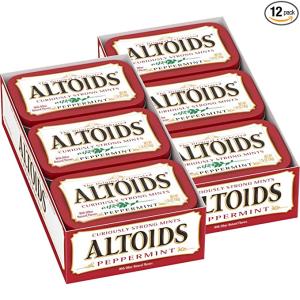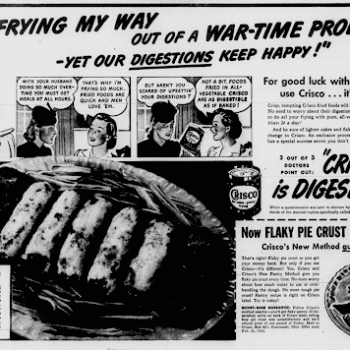I ran across an article, “Calcium and Ulcers.” It stated:
Peptic ulcer[s] . . . used to be treated by giving patients calcium in the form of milk and antacid pills containing calcium carbonate. But researchers have have found that calcium actually makes many ulcers worse and have replaced calcium treatment with other medicines and surgery. . . .
Calcium is a mineral that your body needs to keep your bones and teeth strong. Calcium products appeared to soothe ulcer pain, so doctors encouraged patients to drink milk and take calcium carbonate antacids. But physicians eventually realized that using calcium as an ulcer treatment was not a good idea. Calcium stimulates the stomach to produce more acid and digestive juices, which worsens ulcers. . . .
If you are diagnosed with a peptic ulcer, ask your doctor if you should cut back on drinking milk and stop taking calcium carbonate antacids and supplements. If milk and calcium carbonate supplements are your primary calcium sources, ask your physician to refer you to a dietitian who can advise you on how to increase other sources of calcium in your diet, such as sardines, kale and broccoli, which will not trigger stomach acid production in the same way that milk and calcium carbonate do.
I’ve been relying on Extra Strength Rolaids antacids for my ulcer and digestive problems. Each pill contains 675 mg of calcium carbonate, and it says “2-4 tablets as symptoms occur.” That’s 1350 to 2700 mg calcium. Even on the bottle of Rolaids it warns to “not take more than 10 tablets in a 24-hour period” and “do not use the maximum usage for more than two weeks.”
*
Rolaids pills (especially the mint ones) do definitely provide fast and temporary relief (which is obviously why people take ’em), but ironically, they may be exacerbating the root cause of the problem at the same time. I’ve been using them at a ridiculous rate, even though I knew over four years ago (when I wrote the earlier version of this article on Facebook) that they actually make the problem worse in the long run. I just wanted the “quick fix.” It’s easy to fall into that. But antacids raise stomach acid pH, making it easier for the bacterium Helicobacter pylori, which we now know is the primary cause of ulcers, to thrive.
*
Another article, written by a doctor, states:
*
Stomach ulcers occur when the hydrochloric acid has eaten away at the stomach lining. We used to think this was because of increased stomach acid, but research now suggests that it is due to decreased protection for the stomach lining and increased susceptibility to the H. Pylori bacteria. . . .*
[A]ntacids . . . can actually make things worse. . . . Medications that prevent the production of stomach acid (antacids) do so either by directly neutralizing acid or by blocking the production of acid with PPIs or H2 blockers—these block histamine receptors on the parietal cells so they don’t receive the signal to make stomach acid.
*
Yet another article concurs:
*
An estimated 90% of duodenal (intestinal) and 65% of gastric ulcers are caused by H. pylori. It is also recognized that the initial H. pylori infection probably only takes place when the acidity of the stomach is decreased. In a human inoculation experiment, infection could not be established unless the pH of the stomach was raised (thus lowering the acidity) by use of histamine antagonists.
*
By lowering stomach acid and increasing stomach pH, acid suppressing drugs [e.g., Tagamet, Prilosec, Zantac] increase the risk of H. pylori infection and subsequent development of duodenal or gastric ulcers.
*
Dr. Ronald Hoffman writes in his article, “Antacids: Not the anti you think they are”:
*
The fact is, however, that most upset stomachs are caused not by too much stomach acid but by the wrong food or too much food. If the culprit is identified or destructive eating patterns are changed, the problem can virtually always be corrected without antacids.
*The other problem with using antacids for an upset stomach is that they don’t work. “What?!” you say. “I can tell the difference after I take it!” Actually, unless you have an ulcer, this is probably a placebo effect. Antacids were clinically proven ineffective by a Swedish study in 1986. In fact, antacids will sometimes cause your stomach to produce more acid—a condition called acid rebound, which worsens your GI problem. Also, antacids change the pH environment of the gut, potentially causing an imbalance of friendly flora and putting you at risk for infection by the unfriendly types. Some believe that antacids may even help set the stage for infection with Helicobacter pylori, the bacterium that causes ulcers.
*
I just ordered Peppermint Altoids today, as an alternate mint tablet without the calcium. We’ll see how that works. In any event, tons of calcium when one has an ulcer is adding fuel to a fire. It’s dumb. I’ve fallen into the trap again, knowing that it actually wouldn’t help in the long run. It’s okay to get immediate relief, but if the “cure” is literally prolonging the problem, then something has to change. It’s like continuing to add water to a bucket with a big hole in it.
*
Related Reading
*
*
*
Photo credit: Altoids Classic Peppermint Breath Mints, 1.76 Ounce (Pack of 12) [Amazon product page]
*
Summary: Relying on antacids like Rolaids or Tums actually exacerbates the problem that brings about the symptoms, that they do indeed help. I use non-calcium mints instead.

















